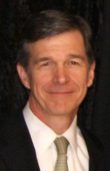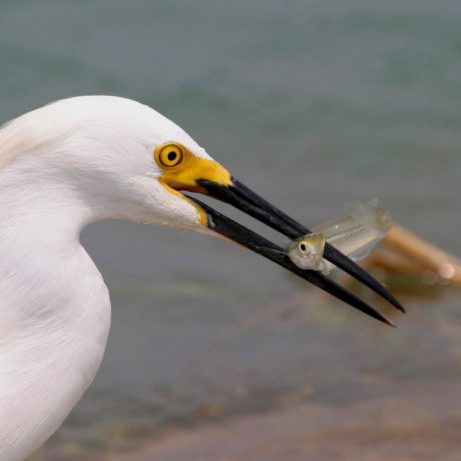RALEIGH — The chairs of key environmental commissions, the secretary of the Department of Environmental Quality, the department’s chief counsel and at least some of its division chiefs — that’s the short list of personnel changes ahead at DEQ as Gov-elect Roy Cooper readies to take office.
With a prolonged election challenge that took more than a month to resolve, the timetable for changeover from the McCrory administration to the Cooper administration has been compressed, even more so with Cooper’s announcement last week that he plans to take the oath of office on New Year’s Day instead of at the inauguration six days later. In an interview last week, the governor-elect said he’s eager to get to work.
Supporter Spotlight
After Gov. Pat McCrory’s concession on Dec. 5, Cooper’s transition team accelerated work on the details of changes in every department and agency of the executive branch. Typically, change starts at the top.

Ken Eudy, one of Cooper’s main advisers for the transition, said the governor-elect is looking for someone for the DEQ post who is “dripping with integrity” to restore confidence in the department.
“The top priority for Cooper is to restore the credibility of the Department of Environmental Quality as a regulator,” Eudy said. “The key is to have somebody in that role that all the stakeholders in DEQ respect.”
During the campaign, Cooper had challenged the administration’s response on coal ash and its handling of potential drinking water contamination.
Eudy declined to name names, but said the suggestions are flowing. “There are a lot of fan clubs out there for various people.”
While there will be changes at the top, Eudy said he does not expect there to be wholesale personnel changes throughout DEQ.
Supporter Spotlight
“I don’t think you’ll see the governor-elect going in and dropping a neutron bomb on the place. There are a lot of career state employees who are doing a good job and the last thing you want to do is hollow out the department for a year while you fill those positions.”
Although division chiefs within DEQ are political appointees, it remains unclear to what extent changes will be made. McCrory retained several DEQ division chiefs from the previous administration of Gov. Bev Perdue, but during the past four years the agency was substantially restructured. The forestry and state parks divisions were moved to other departments, taking with them large portions of DEQ staff.
Sen. Brent Jackson, R-Sampson, who heads up the Senate’s budget committee on agriculture, environment and natural resources, said last week that he approves of a cautious approach to the changes at DEQ.
“I don’t know that you need to clean out any agency just because of a change administration, because we have so much historical knowledge,” he said. “It’s not bad to have some gray hairs around when you’re trying to do some things.”
Robin Smith, a former assistant secretary and a veteran of several transitions when DEQ was known as the Department of Environment and Natural Resources, said personnel changes are just one piece of the transition.
Smith, who is serving on a Cooper planning group for DEQ, said there’s always a focus on basics, like pulling together information on employees and the budget, but the job is also to flag significant decisions the new governor might need to make soon after being sworn in.

“Are there pending issues, whether it’s proposed rules or policies or litigation, that he needs to be aware of so that he can assess whether things are headed in the direction he wants them to go from a policy perspective?” she said, describing some of the questions to be answered.
Transitions begin at the secretary level and quickly work their way down, Smith said. Other appointed positions that tend to be filled early include the department’s general counsel, main staff in the secretary’s office and the division directors within the department.
Each administration has the authority to fill top-level positions, but the number of positions at DEQ hired by the Cooper administration could change.
The General Assembly has a history of adjusting the number of positions available to the governor, especially when there’s a change in political party. Ahead of McCrory’s election in 2012, the legislature increased the number of positions the governor could appoint from roughly 500 to close to 1,500.
The legislature could also shift the number of appointments to boards and commissions. In 2013, the House and Senate agreed on a measure that abruptly ended the terms of dozens of appointees of former Gov. Bev Perdue, including members of the Environmental Review Commission and the Coastal Resources Commission. The Coastal Resources Advisory Council was also revamped and the terms of all 45 members ended.
In addition to his share of appointments on boards and commissions, Cooper will have the authority to change who heads up key environmental commissions right away.
Smith said that while Cooper won’t be able to appoint new members to the Environmental Management Commission and the Coastal Resources Commission until terms of some of their members expire in June 2017, he could as governor change the designation of the chair from among existing members.
Eye on the Special Session
The incoming administration will also keep close tabs on what happens this week during the legislature’s special session on disaster recovery, Eudy said. The session convenes at 10 a.m. Tuesday.

With at least $300 million in additional federal aid secured under a stopgap funding bill Congress passed last week, legislators will be looking at additional funding needs for recovery projects along with potential policy changes on resiliency in flood-prone areas.
Eudy said the Cooper administration plans to be involved in the discussions. “We will own disaster recovery after January 1st,” he said. “We care about that and we care about anything else they might be interested in taking up.”
The session is expected to cover more than a recovery package for eastern areas hit by Matthew and western areas dealing with wildfires and severe drought.
Under McCrory’s official request for the session, issued on Thursday, the General Assembly has the option to take up other legislation.
House and Senate leaders have pointed out that could include several measures left hanging in July as this year’s short session drew to a hasty close after a rebellion in the House against a Senate-backed measure on local redistricting.
Among the possible bills for consideration in the special session is an extensive set of regulatory changes that was hammered out between House and Senate negotiators, but failed to reach the floor of either chamber.
Items in controversy during the negotiations were Senate-backed provisions ending the state’s electronics recycling program, restrictions on wind-energy projects and a loosening of regulations on stormwater, beach re-nourishment projects and sandbag rules. Although House negotiators said they had reached an agreement with their Senate counterparts the night before adjournment, a final version of the bill was never introduced.
Other Changes Ahead

Bill Holman, who was the state’s environmental secretary under Gov. Jim Hunt, including during the changeover to Gov. Mike Easley’s administration, said it’s important for the incoming administration to know the hot issues right away.
Holman, who is now state director of the Conservation Fund, a national land conservation and economic development organization, said there are plenty such issues awaiting the new administration. While some may be obvious, such as those dealing with coal ash, water quality and droughts, there are also projects going on behind the scenes, such as the massive review of all state environmental rules ordered in 2011 under the General Assembly’s regulatory reform agenda.
“It’s a ton of work,” Holman said. “In addition, you’ve got all the other things going on. You’ve got to get a budget ready for the biennium, you’ve got Hurricane Matthew recovery and you’ll have big changes in environmental policy at the national level. It’s a lot to do.”
Holman said with the number of changes ahead the department would benefit with a collaborative leader.
“Someone who can find some issues to work with the General Assembly on,” he said. “And there are a lot of things the state and local governments ought to be working together on, from water quantity to water quality.”
The new administration will also have to take over from the McCrory team an array of legal battles and negotiations.
Eudy said Cooper is weighing what to do about handling DEQ-related legal work, which was highlighted during the political fight between Cooper and McCrory. Earlier this year, DEQ terminated a contract with the Cooper-led attorney general’s office for work by its environmental legal team.
Eudy said no decision had been made on whether to reinstate the contract. Cooper and Attorney General-elect Josh Stein plan to work together to resolve the matter, he said.
“It’s too early to say. A lot of it depends on the working relationship and on the budget, but I’m sure they’ll have a discussion on that.”







